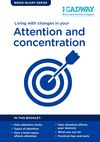
Get the booklet
Download Living with Changes in your Attention and Concentration in pdf format
Attention and concentration are terms used to describe the complex mental processes that allow us to notice things and to take in information from the world around us.

Here we use the term ‘attention’ to refer to both attention and concentration because the two terms are interchangeable.
Difficulties with attention are common following a brain injury. We focus on attention problems in everyday life and suggest tips and advice to help with any difficulties. The suggestions are based on research and people’s own experiences. Try the tips out and see which ones are useful to you. Everyone’s brain injury affects them in a slightly different way. Some suggestions will work for you,
while others may not.
In addition to your brain injury, other things can affect your attention – these include tiredness, hunger, stress, your mood, pain, other illnesses and medications.
“I just can’t focus on one thing at a time. My mind keeps wandering off…”
– Siobhan from Meath
How attention works
Attention involves many complex processes which are not all understood fully yet. However, experts agree that there are a number of different types of attention. We have included some examples below.
Types of attention
- Sustained attention is our ability to keep paying attention to something over a period of time — for example: watching a movie.
- Selective attention is our ability to focus on one thing and to ignore everything else — for example listening to a friend talking in the middle of a busy café.
- Alternating attention is the ability to switch our attention between two things – for example: while you are writing an email, you receive a phone call. After you finish the call, you go back to writing your email.
- Divided attention is our ability to multi-task or, in other words, to do two things at once. Examples of divided attention are: watching television while talking to someone or driving while listening to the news.
How a brain injury affects attention
Attention uses many different areas of the brain in order to work properly. So an injury to any one of these areas can cause difficulties. This is the reason why attention is so often affected after a brain injury. Difficulties include:
- Keeping track of what is being said or done.
- Following instructions or finding it difficult to do more than one thing at a time.
- Being easily distracted, particularly in busy places.
- Feeling overwhelmed when there is a lot going on around you.
- Having trouble picking out what is important from written information.
How attention affects memory
Attention difficulties can affect your memory. If you have trouble noticing something and taking in information about it, you won’t be able to recall it later.
Due to the fact that memory and attention are closely related, it is often hard to tell which one is causing problems. A Psychologist, or Occupational Therapist, can help you understand more about your particular difficulties. They can assess a range of your thinking skills and suggest specific approaches that may help. See also the Memory section .
What can you do
General advice
Any attention difficulties you have will be worse if you are tired or stressed. These common-sense tips may help:
- Eat a healthy diet, get enough sleep and take regular exercise. Even seated exercise is beneficial. See our Fatigue and sleep booklet for more information.
- Every day do something to mentally wind down and physically relax – for example: try meditating or gentle breathing, do a hobby, get in touch with a friend or take part in a group activity
- When you are doing something that requires concentration, take regular breaks.

Tools to aid your attention
| To make it easier to focus on the words when you are reading: |
|
| To cut out background noise: | Use noise-cancelling headphones or ear plugs. |
| To remove distractions when you are using the internet: | Download a computer app that removes the clutter and advertisements from websites. Two such free apps are Readability and Evernote Clearly. If you want to search for other similar apps on the internet, they are known as a ‘Read later’ apps. |
| To make planning your week easier: | Using an organiser can help. You can get a My organiser booklet from Headway. It contains a Diary, Contacts and Personal Details sections, and useful Planning Worksheets. Phone 1800 400 478 to get one. |

Tips for common situations
| If you find it stressful trying to do a few things at once: | Turn off the television and other distractions. Take a few minutes to plan the order in which you are going to do the tasks. Write down the order, if that helps. Stop doing one task before you start another |
| To make it easier to concentrate on a task that has a number of steps in it: | If there are instructions, read over them fully before you start. Follow the instructions step-by-step. Tick off the steps as you complete them. |
| To reduce visual distractions while you are working or doing a hobby: | Keep your work area clear of clutter. Tidy up as you finish each thing you are doing. Keep your workspace, or home, as well-organised as possible. Throw out, recycle or donate things you don’t need. |
| If you need to do an important task: | Start the task when you are feeling fresh. Find a quiet place do the task or use ear plugs. Give yourself enough time so you are not rushing. Put your phone on silent to avoid getting interrupted |
| To make it easier to pick out the important points from a document: | Read one paragraph at a time. Mark the important points in each paragraph using a highlighter pen. |
| If you find it hard to keep track of what is being said at meetings: | Write the information down in a note book or Use your phone or a smart pen to record important things. A smart pen has a mini-computer and voice-recorder built in. Do an internet search for ‘smart pen’ to find out more information if you wish. |
| If you find it difficult to socialise in noisy groups: | Explain to your friends that you find the noise and distractions in busy pubs or cafés difficult. Suggest you meet somewhere quieter. Try meeting one or two people on their own first to see how that goes. |

Summary of key points
- The terms ‘attention’ and ‘concentration’ are interchangeable. They are both terms for the mental processes that allow us to notice things and to take in information from the world around us.
- Attention uses a number of different parts of the brain and difficulties are common after brain injury.
- There are a number of practical things you can try to work around any attention difficulties you may have.
- Memory and attention are very closely related.
- A Psychologist, or Occupational Therapist, can assess a range of your thinking skills to see what your specific difficulties are and what approaches may help.
- Show your friends and family this booklet. It will help them better understand what you are dealing with and how they can help.

Help and information
Psychologists
Headway offers free community-based brain injury assessment, counselling and rehabilitation in Cork, Dublin, Kerry and Limerick. t: 1800 400 478
To access a public psychologist, your GP or Public Health Nurse can refer you. HSE t: 1800 700 700 or visit www.hse.ie
To find a registered private psychologist, contact the Psychological Society of Ireland. t: 01 472 0105 or visit www.psychologicalsociety.ie
Occupational Therapists
To access a public Occupational Therapist, contact your local HSE Health Office or Health Centre. HSE t: 1800 700 700 or visit www.hse.ie
To find a private Occupational Therapist, contact the Association of Occupational Therapists of Ireland. t: 01 874 8136 or visit www.aoti.ie.